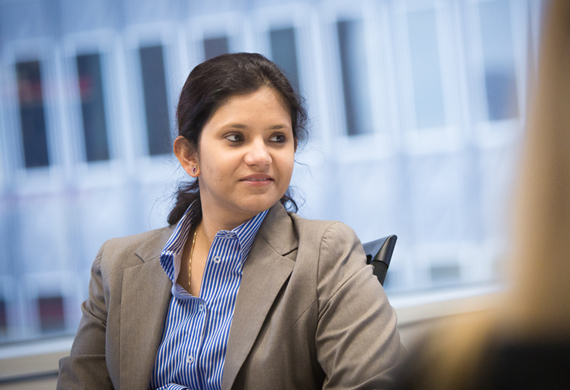
Embracing True Diversity in India: A Journey Beyond Tokenism
By: Shruti Swaroop, Founder, Embrace Consultancy | Monday, 30 October 2023
Shruti Swaroop, Founder of Embrace Consultancy talks about embracing true diversity in workplaces.
In today's world, diversity, equity, and inclusion (DEI) are not just buzzwords. They are the cornerstones of a thriving and inclusive workplace and the economy of a nation. The same holds for India as well. Diversity, equity, and inclusion are pivotal for India's GDP growth.
A more inclusive Indian workforce can harness the full potential of its population, increasing innovation, productivity, and consumer reach. A diverse and equitable society is more harmonious, leading to more robust economic growth. By tapping into the talents and perspectives of all Indians, DEI can significantly boost India's GDP and strengthen its position in the global economy.
However, we as a nation and as individuals need to take a step beyond mere token gestures and dive into embracing true diversity, especially in a diverse and culturally rich country like ours. India is unique in more ways than one. Our vast nation has a kaleidoscope of languages, cultures, religions, and traditions. While this diversity enriches our lives, it can also present unique challenges. True diversity, therefore, requires more than just hiring individuals from different backgrounds. A true DEI approach calls for recognizing and addressing these multifaceted disparities in our everyday lives.
The impact of true diversity in India can propel our country’s growth. Diverse teams lead to more innovation and creativity. A study by McKinsey highlighted that companies in the top quartile for ethnic and cultural diversity in their workforce were 33% more likely to have industry-leading profitability. Besides this, diverse teams excel at problem-solving. By bringing together people with different perspectives, companies garner the ability to explore a more comprehensive range of potential solutions.
With India's diverse customer base, understanding and catering to varied preferences are vital. A study by Kantar Millward Brown found that ads that reflect India's diverse cultures tend to perform better. A diverse workforce fosters a more inclusive and welcoming company culture. This leads to increased morale, engagement, and employee retention. A study by PwC reveals that 85% of CEOs with a formal diversity and inclusion (D&I) strategy in India report positive impacts on their business.
Therefore, to navigate beyond tokenism and truly foster diversity in India, understanding the disparities that exist, not only in the workforce but in everyday life is crucial. Here's how we can work toward a more inclusive environment:
1. Cultural Sensitivity Training: India's cultural tapestry is woven with countless threads. Offering cultural sensitivity training to employees could help build bridges of understanding. It's about more than just recognizing festivals. It's about understanding the cultural nuances and practices specific to different regions and communities.
2. Language Inclusivity: Language is an integral part of India's diversity. Encouraging the use of multiple languages within the workplace and ensuring that all employees can communicate effectively is one of the most important aspects of DEI. Language barriers must not hamper anyone's growth.
3. Mentorship and Sponsorship Programs: Establishing mentorship and sponsorship programs specifically tailored to help underrepresented groups can help them advance in their careers and create an equal ground for everyone. Such programs can provide crucial support to employees striving for success, regardless of their background.
4. Gender Equity Initiatives: Gender diversity is an essential aspect of true diversity. In India, the participation of women in the workforce is still significantly lower than men. According to McKinsey, India could increase its GDP by $770 billion by 2025 by bridging the gender gap in workforce participation. This issue like other inclusivity issues is not just specific to the workforce. It stems from much deeper stereotypes and a lack of opportunities for women in education, at home, etc. Implementing policies and practices that promote gender equity is essential not just in the workplace but also at the grassroots level.
5. Accessibility: Accessibility is one of the biggest hurdles. Lack of accessibility hampers people with special abilities to even conduct their routine tasks. Accommodating the workplace for people with special abilities is the first step to making the work culture inclusive. In today’s digitized world, this extends to digital accessibility too, as more tasks shift online.
The road to true diversity requires constant evaluation. Measuring progress and adapting strategies accordingly is essential. This could involve conducting regular diversity audits, anonymous surveys, and analyzing promotion and hiring data to identify areas that need attention.
Leadership plays a pivotal role in driving true diversity. Encouraging senior leaders to sponsor diverse talent can create a culture of inclusivity. Ensuring that leaders not only embrace diversity but are committed to implementing cultural change within the organization is what differentiates tokenism from the actual effort. Education is key. Consulting a DEI instructor can work wonders for any workplace. The role of a DEI instructor is instrumental in enlightening the workforce about the importance of diversity and how to navigate it respectfully. By offering regular DEI training and discussions, organizations can foster awareness and empathy among employees.
True diversity is about understanding the nuances of this diverse nation, recognizing the disparities, and implementing strategies to address them. It's a journey that requires continuous effort, education, and commitment from every member of the organization.
Diversity isn't just a checkbox exercise or a token gesture, it’s an ongoing commitment to embrace the richness of human differences and harness their collective power. By nurturing this diversity, India's workplaces can unlock their full potential and lead the way toward a brighter, more inclusive future for all.
About the Author: Shruti Swaroop completed her coaching certification through both Marshall Goldsmith and ICF & has coached over 350 individuals globally, including CEOs, and has accumulated over 3000 hours of coaching experience. As a TEDx speaker and an empaneled speaker with TOSB and IWD2020-23, she has spoken at various panels on topics such as Women's Leadership, Coaching, Growth Mindset, Executive Presence, Confidence, and Finding our Bearings.






